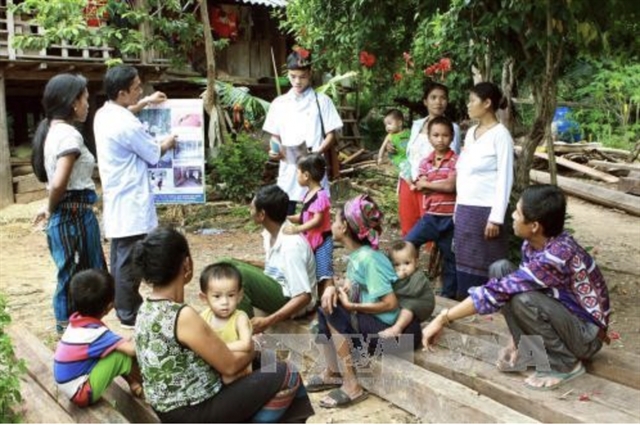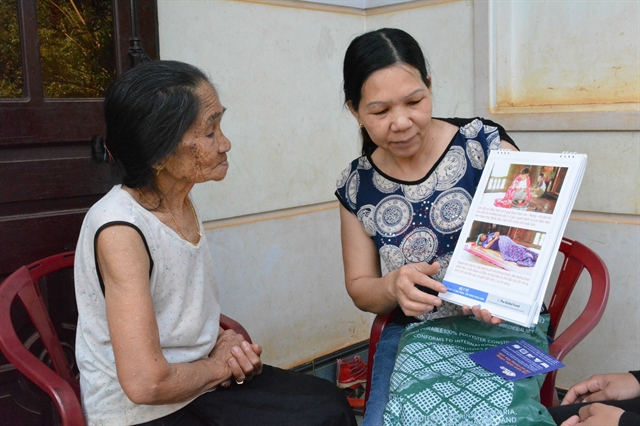 Society
Society

 |
| Healthcare workers in Cư Huê Commune (Ea Kar, Đắk Lắk) educate residents on malaria prevention and control. VNA/VNS File Photo Nguyễn Tuấn Anh |
HÀ NỘI — The number of malaria cases in Việt Nam continued to decline in 2024, with the Ministry of Health recording 353 cases, a 21 per cent decrease compared to the previous year.
One third of these cases were imported, and no deaths or outbreaks were reported, highlighting the country’s progress in eliminating the disease.
According to Hoàng Đình Cảnh, Director of the National Institute of Malariology, Parasitology and Entomology, malaria cases and fatalities in Việt Nam have steadily decreased over the past decade.
Between 2014 and 2024, the number of cases dropped by 97.76 per cent, from 15,752 cases down to 353 annually. The most significant declines occurred between 2014 and 2016, when cases were halved each year, and from 2019 to 2021, when they decreased more than three-fold annually.
In 2024, the total number of cases fell by 21.21 per cent compared to 2023, with no malaria-related deaths recorded, a reduction of two cases from the previous year. Additionally, there were no reported outbreaks of malaria.
The country has made notable progress in eliminating malaria, with 48 provinces and cities officially recognised as malaria-free. The Government’s targets for malaria prevention, control and elimination have been met in accordance with the national roadmap.
The National Institute of Malariology, Parasitology and Entomology has played a key role in directing and supervising malaria prevention and elimination efforts. It has implemented early detection and rapid treatment strategies for malaria patients while collaborating with local health authorities to address malaria hotspots, including Khánh Vĩnh District (Khánh Hòa), Mường Tè District (Lai Châu), Hướng Hóa District (Quảng Trị) and several provinces such as Ninh Thuận, Gia Lai, Đắk Lắk and Đắk Nông.
Việt Nam’s National Strategy for Malaria Prevention, Control and Elimination, approved by the Prime Minister under Decision No 1920/QĐ-TTg (October 27, 2011), sets out a roadmap for malaria elimination. This strategy is further reinforced by the Ministry of Health’s Decision No 08/QĐ-BYT (January 5, 2017) and Resolution No 20-NQ/TW (October 25, 2017) issued by the Party Central Committee. These documents reaffirm Việt Nam’s commitment to eliminating malaria by 2030.
To achieve complete malaria elimination by 2030, Cảnh emphasised that Việt Nam must ensure zero locally transmitted cases by 2027. This requires intensified screening and testing for high-risk groups, early detection and treatment of parasite carriers and comprehensive vector control measures such as mosquito spraying and widespread use of mosquito nets in malaria-prone areas.
Equally important is the need to prevent malaria from resurging in the 48 localities that have already been declared malaria-free. Since malaria is transmitted by mosquitoes, eliminating the vector remains a complex challenge. The institute continues to monitor mosquito populations and vector risks in key areas.
"In locations with dense mosquito populations, the risk of malaria transmission remains high. In such cases, we recommend chemical spraying and advise residents to sleep under mosquito nets. Additionally, early detection and treatment of parasite carriers are essential, as these individuals are the main sources of transmission, particularly in imported cases," Cảnh said.
Despite this significant progress, malaria remains a major public health concern, particularly in low- and middle-income countries. The disease is caused by Plasmodium parasites and is transmitted through Anopheles mosquitoes. Since there is no widely available malaria vaccine, vector control remains the most effective method of prevention. If left untreated, malaria can lead to severe complications and even death.
Health authorities are urging the public to take active measures against mosquito bites to reduce the risk of malaria and other mosquito-borne diseases.
Individuals travelling to malaria-endemic regions, particularly in Africa or remote forested areas, are advised to carry mosquito nets and seek medical advice before departure for prophylactic medication. Upon returning from high-risk areas, travellers should undergo screening to detect infections early and ensure timely treatment. — VNS




